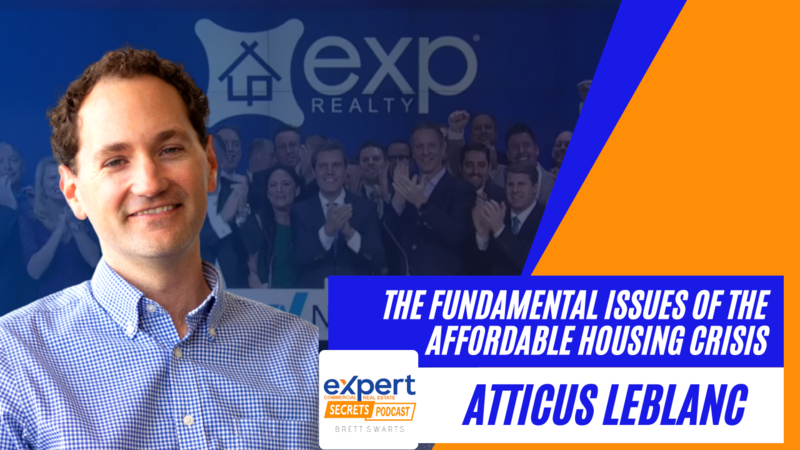

The Fundamental Issues of the Affordable Housing Crisis

“I've historically had a unique ability to assess problems from multiple angles and figure out solutions that a lot of people either haven't thought of or maybe just are really outside the realm of accepted practice, to be able to address that head-on in a new way.”
Atticus is the Founder of PadSplit. A seasoned entrepreneur with a deep understanding of housing, real estate, and construction, and he's always seeking ways to improve neighborhood schools or governments.
For about 20 years, and has been in housing for the last 14 years, he started his career in commercial real estate, site collection acquisition for some major developers around the country and pivoted to residential construction and acquisition, rehab, renovations, and rentals. Starting in 2008, in the financial crisis of own and manage about 550, affordable rentals pretty much run the gamut across different affordable housing programs.
Watch the episode here
Brett:
I'm excited about our next guest because he's an expert in this. He's a seasoned entrepreneur with a deep understanding of housing, real estate, and construction, and he's always seeking ways to improve neighborhood schools or governments. He's now in Georgia, and he has an amazing company that's we're gonna be talking about but we're first going to dive into all things. The housing crisis, please welcome the show with me, Atticus LeBlanc. Atticus, how are you doing?
Atticus:
Doing great. A pleasure to be here.
Brett:
I got to say your name is might be the coolest name for anyone who's been on the show so far. Maybe talk about that more in the future than later in this episode. But in the meantime, would you give our listeners a little bit more about your story and your current focus?
Atticus:
Being in being in real estate here in the Atlanta area for about the last 20 years, and been housing for the last really 14 years of that started my career in commercial real estate, doing site collection acquisition for some major developers around the country and then pivoting to residential construction and acquisition, rehab, renovations, and rentals, starting in 2008, in the financial crisis of own and manage about 550, affordable rentals pretty much run the gamut across different affordable housing programs, and really seen it from the front row and from a pretty high level. It's been a wild ride.
Brett:
We're going to dive into again, the fundamental issues of the horrible housing crisis here in a minute, and but before we go there, I want to take one other step back, help our listeners get to know you a little bit better, and also myself. I believe we've all been given certain gifts and these gifts that are given to us to be a blessing help to others. Some people call them superpowers, some people call them strengths. I'm curious, what are those one or two gifts that you believe you were given? How does it help how you help and bless people today?
Atticus:
For me, it's definitely creative problem solving, I think I've historically had a unique ability to assess problems from multiple angles and figure out solutions that a lot of people either haven't thought of or maybe just are really outside the realm of accepted practice, to be able to address that head-on in a new way.
Brett:
I think that's perfect, why you're probably in the space, and by the way, you can learn more about Atticus LeBlanc and what he does at PadSplit.com. Atticus, let's dive into the first part of the biggest challenge or the biggest thing to try to understand when it comes to the housing crisis. Maybe you can define it in your words, and how you see it, and perhaps how people aren't seeing it today and how you're seeing it, and then let's talk about some solutions after that.
Atticus:
That sounds great. Really two major problems that folks need to be aware of one I'm sure if anyone's been paying attention, the news they've seen, we have a massive supply problem, and so this boils down to basic economic fundamentals of supply and demand, and for the last 12 years, we really just haven't produced nearly enough supply of housing, to be able to maintain affordability in any sense of the word. The second problem, which is equally as significant, but much lesser understood is access, and as we look at how housing providers mitigate risk through qualifying criteria, such as minimum incomes at three times the monthly rent, minimum credit score's minimum deposits, all of these things ultimately create barriers to access and it's at a point now where there's a huge portion of the population really look at anybody earning less than $40,000 a year simply cannot qualify for the many apartments or most of the traditional housing options in their areas.it means that the people who are serving our community literally and working there cannot afford those traditional housing options.
Brett:
Got it. The first one is just supplied. That's pretty obvious. We're just there's too much demand, not enough supply being created, and that's a challenge if you can maybe dig into some of those ways to solve that. The second one is just access that it's difficult for people to even qualify for even to rent the rent, or, of course, the house. Because of the three times the monthly rent, typical minimum requirement, and the minimum credit score, so if you're making less than $40,000 a year, good luck getting qualified. Is that a fair summary so far?
READ AND LISTEN TO OUR FULL EPISODE




Comments